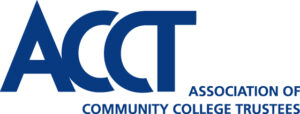“Kids on Campus”, a project by the National Head Start Association (NHSA) and the Association of Community College Trustees (ACCT), aims to bring Head Start classrooms onto community college campuses.
A three-year-old begins to cry, “Mama. Where’s mama?” His teacher says, “Let’s go over to the window and see if we can see her.” The pair holds hands and heads to the window. “Mama is in that building,” the teacher says, pointing to the academic building next door. “She’s at school just like you. When school is done, she’ll come pick you up.” “Mama at school. Mama come back.” “That’s exactly right, Mama will come back after school.” The boy waves at the building and turns around, heading off to play, “Mama at school like me.”
Just one benefit of having Head Start and Early Head Start classrooms on community college campuses is that homesick children can look out the window and see where their parent is at school. They know mom or dad is close by, and they grow up knowing that parents go to school and learn too—an important model for children to see. They also get a high-quality early learning experience at Head Start, focusing not just on their academic and school readiness skills, but also their physical and mental health, nutrition, and family stability.
While the experience described above is valuable, there are fewer than 100 places around the country where it is possible. That’s why NHSA has teamed up with ACCT to play matchmaker, connecting community colleges with unused space and Head Start programs. For at least the next five years, through the Kids on Campus initiative, we will also provide guidance and technical assistance to the campuses and programs as they navigate through negotiations and renovations, turning an initial introduction into a thriving partnership.
The list of benefits of co-locating Head Start classrooms on community college campuses is expansive, reaching far beyond the children served.
For parents who are pursuing a certificate or degree—many of whom are also working full- or part-time jobs—child care can be one of the greatest barriers to graduation. By serving Head Start children on the college campus itself, parents get free, high-quality care for their child in an easily accessible location. Head Start’s model of supporting the whole family means parents will also get other support they need to persist in school and reach financial stability.
For the Head Start programs themselves, free (or heavily discounted) space on a community college campus is an important contribution to program operations. Federal dollars are only allowed to account for 80% of the Head Start program’s budget; the other 20% must be made up of outside contributions, such as donations of time, space, and money. Free space contributes significantly to this annual requirement, and could even free up funds for other valuable activities if they no longer have to pay rent elsewhere as a result.
The entire child care field is also currently suffering from a significant workforce crisis. Head Start classrooms around the country remain closed, not because they lack children who need services, but because they don’t have enough staff. A strong partnership with the early childhood education department of a community college (made easier by being located on the same campus) can provide a direct pipeline for students earning degrees to go to work in the on-campus Head Start center. These students can get part-time jobs and/or complete a practicum in the center during their studies, enhancing their education and bringing much-needed extra hands into the classroom.
The education department is not the only academic department that can benefit from a partnership with Head Start. Dental hygiene students can get practical experience by providing free cleanings to Head Start children and families. Nursing students can conduct health screenings required by Head Start, giving nurses hands-on experience engaging with young children. Students in culinary or food service-related programs can hone their craft while helping Head Start meet daily meal requirements. Each of these examples provides a valuable service to Head Start, counts as the donated time towards the program’s non-federal-share requirement, and gives practical experience to the college’s students.
Read more about this partnership at our Kids on Campus website.
Photography by Courtney Hale, Getty Images; courtesy of the Seldin/Haring-Smith Foundation.

